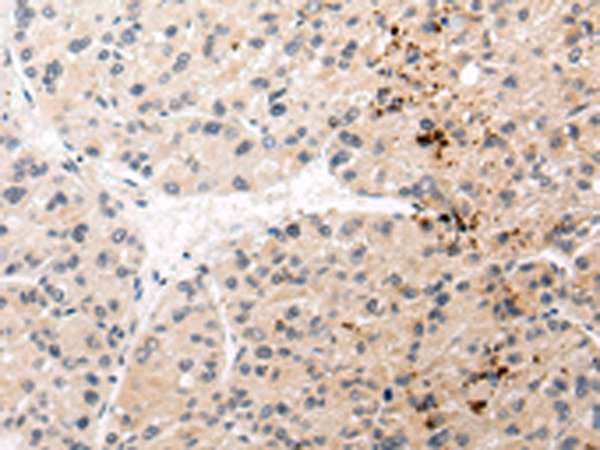
| WB | 咨询技术 | Human,Mouse,Rat |
| IF | 咨询技术 | Human,Mouse,Rat |
| IHC | 1/20-1/100 | Human,Mouse,Rat |
| ICC | 技术咨询 | Human,Mouse,Rat |
| FCM | 咨询技术 | Human,Mouse,Rat |
| Elisa | 1/2000-1/5000 | Human,Mouse,Rat |
| Aliases | AQPX1 |
| Host/Isotype | Rabbit IgG |
| Antibody Type | Primary antibody |
| Storage | Store at 4°C short term. Aliquot and store at -20°C long term. Avoid freeze/thaw cycles. |
| Species Reactivity | Human |
| Immunogen | Synthetic peptide of human AQP11 |
| Formulation | Purified antibody in PBS with 0.05% sodium azide and 50% glycerol. |
+ +
以下是关于AQP11抗体的3篇代表性文献的简要信息:
1. **"Aquaporin-11 knockout mice develop polycystic kidneys with impaired electrolyte transport"**
- 作者:Morishita Y, Matsuzaki T, Hara-Chikuma M 等
- 摘要:研究利用AQP11特异性抗体,证实AQP11基因敲除小鼠肾脏中该蛋白缺失,导致肾小管电解质转运异常及囊肿形成,揭示了AQP11在维持肾小管稳态中的作用。
2. **"Immunolocalization of aquaporin-11 in the mouse liver and kidney: evidence for a role in bile and urine concentration"**
- 作者:Ikeda M, Beitz E, Kozono D 等
- 摘要:通过AQP11抗体的免疫组化分析,发现该蛋白在小鼠肝脏胆管上皮细胞和肾脏远端小管高表达,提示其可能参与胆汁浓缩和尿液渗透压调节。
3. **"AQP11 deficiency disrupts organelle homeostasis leading to endoplasmic reticulum stress and hepatic steatosis"**
- 作者:Tamura M, Morishita Y, Kyuno F 等
- 摘要:研究利用AQP11抗体检测肝脏细胞中蛋白定位,发现AQP11缺失导致内质网应激及脂质代谢异常,表明其在细胞器膜稳定性中的关键功能。
这些文献均通过AQP11抗体进行蛋白定位或功能验证,涵盖肾脏、肝脏疾病模型及分子机制研究。如需具体期刊或年份信息,可进一步补充关键词检索。
Aquaporin-11 (AQP11) is a member of the aquaporin family, a group of transmembrane channel proteins that facilitate water and small solute transport across cellular membranes. Unlike classical aquaporins (AQP1-AQP10), AQP11 belongs to the "superaquaporin" or "unorthodox" subfamily (AQP11-AQP12) due to its distinct structural features, including a unique NPA motif (asparagine-proline-alanine) critical for channel function. AQP11 is primarily localized in intracellular membranes, such as the endoplasmic reticulum and mitochondria, suggesting roles in regulating intracellular water homeostasis, organelle volume, and metabolic processes. Studies in mice have linked AQP11 deficiency to renal dysfunction, polycystic kidneys, and cell vacuolation, highlighting its importance in cellular osmoregulation and organ health.
Antibodies targeting AQP11 are essential tools for investigating its expression, localization, and function. These antibodies are typically developed using immunogenic peptides or recombinant protein fragments and validated via techniques like Western blotting, immunohistochemistry (IHC), and immunofluorescence (IF). Due to AQP11's intracellular localization, effective antibody detection often requires optimized tissue fixation and permeabilization protocols. Commercial AQP11 antibodies are widely used in research on kidney diseases, metabolic disorders, and cancer, where AQP11 dysregulation has been implicated. However, researchers must verify antibody specificity using knockout controls, as cross-reactivity with other aquaporins or proteins remains a potential challenge. Ongoing studies aim to clarify AQP11's mechanistic roles and therapeutic potential in human diseases.
×